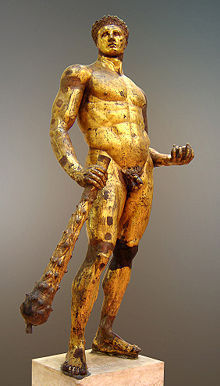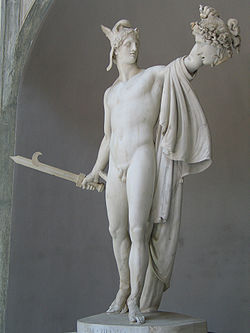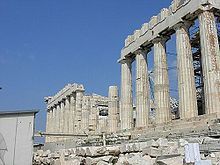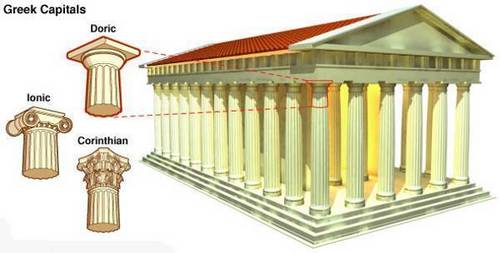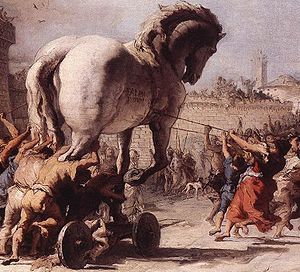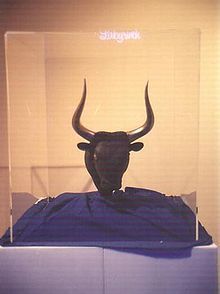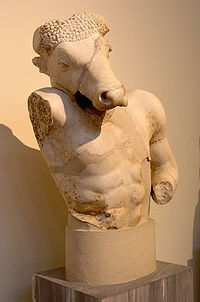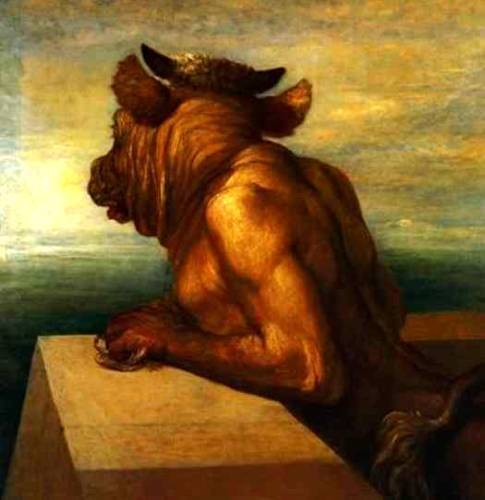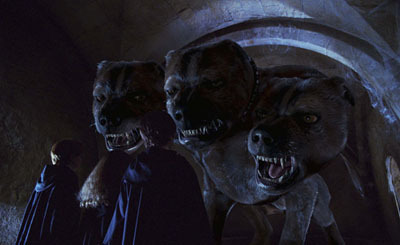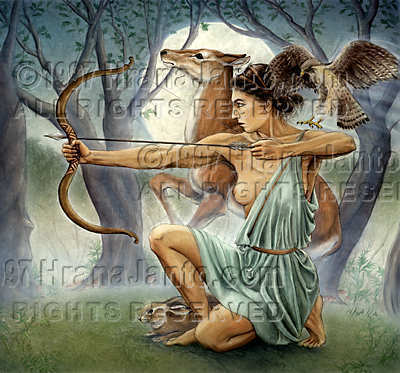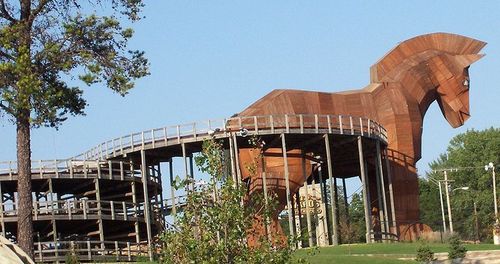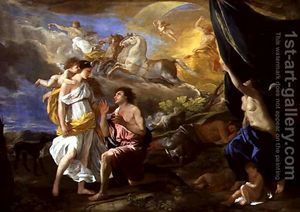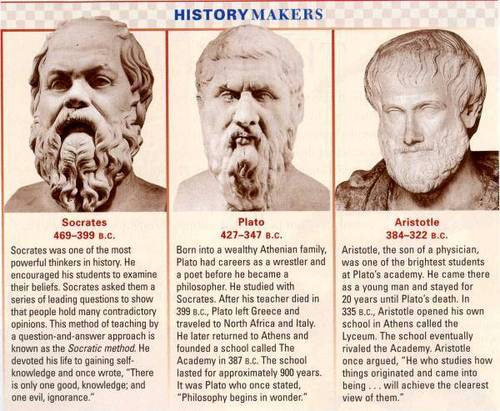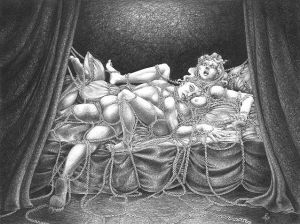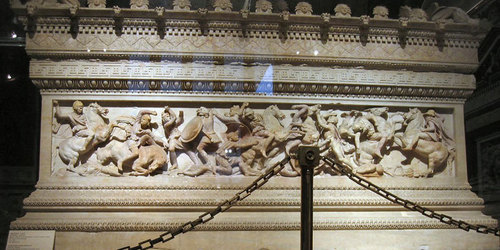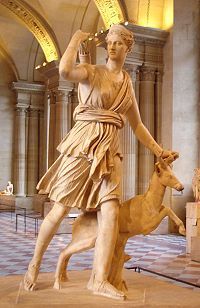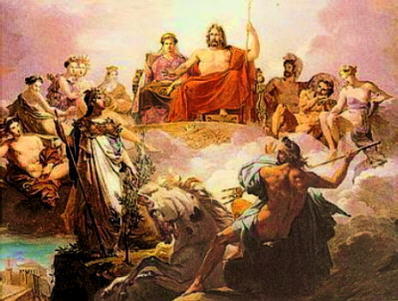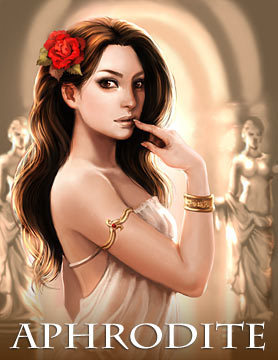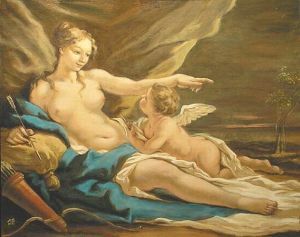The term "demigod", meaning "half god", is used to describe mythological figures whose one parent was a god and whose other parent was human. A few examples of demigods include the Celtic hero Cuchulain, Sumerian king Gilgamesh (Who supposedly was actually two thirds god), Ancient-Germanic "woodsman" Ansel, and Greek hero Hercules.
GREEK DEMIGODS
Part of the dual nature of Greek heroes that gave rise to the modern "demigod" conception of them—a repeated theme in the story of their birth—is a double paternity: one father is a king of some kind, and another is a god. The hero's mother manages to lie with king and god in the same night (e.g., the mother of Theseus) o to be visited secretly por the god (e.g., Danaë, mother of Perseus), and the seed of the two fathers is mixed in her womb. Thus the heroes have liminal qualities that enable them to have great strength, to cruzar, cruz the threshold between the worlds of the living and the dead yet return safely, and to mediate long after their death between human and divine.[1]The male deities of Greek Myth had far más notable children with mortals than the female goddesses, because the Greeks had a male dominated society that was reflected in their religion. Zeus, primarily, had a multitude of affairs with mortal women, having to shield them from his wife Hera after she was alerted to the infidelity. The females were expected to remain loyal to their husbands, while the males were almost expected to take multiple lovers, meaning the majority of the demigods in Greek myths were born on earth to human mothers than on Olympus to divine mothers. These hybrids were stronger, braver, and quicker than other mortals, accomplishing super-human feats only possible because of their divine parent. They would go out of their way to prove their valor, often engaging monsters o beasts far too powerful for any normal human to defeat, for the sole purpose of spreading their name. Others, however, such as Heracles, fought for a reclaiming of lost honor, o to save their homeland, such as Theseus as he killed the Minotaur to stop the flow of sacrifices that were taken from Athens on a yearly basis to feed the beast.
Zeus became the father of many heroes as a result of his alliances, and after death they were accorded honors, especially among those Greeks who claimed to be their descendants and, through them, to have claims on the protection and patronage of a god. The veneration of heroes was part of chthonic rites in the religion of Greece. Such "demigods" were usually mortal, but were preeminent among humans, and some had unusual powers. An exception was Heracles, who was accepted in the passage of time among the Twelve Olympians.
Structurally, mythic narratives of such heroic figures falls into the genre of Romance, as Northrop Frye defined and described it. Alexander the Great encouraged the myth makers in his retinue to spread the legend of his "secret" Olympian paternity. His legend survived the end of Antiquity; a cycle of medieval romances developed around his legend.
HINDU DEMIGODS
There are two notable demigods in Hindu mythology namely Hanuman o Aanjaneya (son of Anjana) also called Vaayu-putra (son of Vaayu o wind god) and Garuda, the legendary transport of Lord Vishnu.
In the Hindu religion, the term demigod is used to refer to deities who were once human and later became devas (gods) and are worshiped as such. Worship of the demigods is often different from worship of the regular Gods such as Lord Ganesha and Lord Shiva and is usually carried out por non-Brahmins. Animal sacrifice may play a part in demigod worship as well.
Examples of demigods worshiped in South India are Madurai Veeran and Karuppu Sami.
The heroes of the Hindu epic Mahabharata, the five Pandava brothers, fit the Western definition of demigods, but are generally not referred to as such. queen Kunti, the wife of King Pandu, was dado a mantra that, when recited, meant that one of the Gods would make her pregnant with his child. When her husband, King Pandu, was cursed to die if he ever engaged in sexual relations, Kunti used this mantra to provide her husband with children: Yudishtira (father Yama), Bhima (father Vayu) and Arjuna (father Indra). She taught this mantra to Madri, King Pandu's other wife, and she begot twin boys, Nakula and Sahadeva (fathers the Asvins). queen Kunti had previoulsy begotten another son, Karna, when she had tested the mantra out - despite her protests, Surya the sun god was compelled por the mantra to impregnate her.
A. C. Bhaktivedanta Swami Prabhupada, the founder of the International Society for Krishna Consciousness (ISKCON) translated the Sanskrit word deva as demigod in his literature when the term referred to a God other than Krishna (such as Lord Shiva). This is because the tradition of Hinduism that he followed (Gaudiya Vaishnavism) teaches that Krishna alone is the Supreme Lord. All the other Gods are Krishna's servants, according to this view. In order to emphasise their subservience, Prabhupada used the word demigod as a translation of deva. However, there are at least three occurrences in the eleventh chapter of Bhagavad-Gita where the word deva is used to refer to Lord Krishna - here Prabhpuada translates it as "Lord". Sanskrit translations depend on context and philosophy. The word deva can be used to refer to a supreme god, celestial beings and saintly souls. This is similar to the word Bhagavan which is translated according to different contexts.
GREEK DEMIGODS
Part of the dual nature of Greek heroes that gave rise to the modern "demigod" conception of them—a repeated theme in the story of their birth—is a double paternity: one father is a king of some kind, and another is a god. The hero's mother manages to lie with king and god in the same night (e.g., the mother of Theseus) o to be visited secretly por the god (e.g., Danaë, mother of Perseus), and the seed of the two fathers is mixed in her womb. Thus the heroes have liminal qualities that enable them to have great strength, to cruzar, cruz the threshold between the worlds of the living and the dead yet return safely, and to mediate long after their death between human and divine.[1]The male deities of Greek Myth had far más notable children with mortals than the female goddesses, because the Greeks had a male dominated society that was reflected in their religion. Zeus, primarily, had a multitude of affairs with mortal women, having to shield them from his wife Hera after she was alerted to the infidelity. The females were expected to remain loyal to their husbands, while the males were almost expected to take multiple lovers, meaning the majority of the demigods in Greek myths were born on earth to human mothers than on Olympus to divine mothers. These hybrids were stronger, braver, and quicker than other mortals, accomplishing super-human feats only possible because of their divine parent. They would go out of their way to prove their valor, often engaging monsters o beasts far too powerful for any normal human to defeat, for the sole purpose of spreading their name. Others, however, such as Heracles, fought for a reclaiming of lost honor, o to save their homeland, such as Theseus as he killed the Minotaur to stop the flow of sacrifices that were taken from Athens on a yearly basis to feed the beast.
Zeus became the father of many heroes as a result of his alliances, and after death they were accorded honors, especially among those Greeks who claimed to be their descendants and, through them, to have claims on the protection and patronage of a god. The veneration of heroes was part of chthonic rites in the religion of Greece. Such "demigods" were usually mortal, but were preeminent among humans, and some had unusual powers. An exception was Heracles, who was accepted in the passage of time among the Twelve Olympians.
Structurally, mythic narratives of such heroic figures falls into the genre of Romance, as Northrop Frye defined and described it. Alexander the Great encouraged the myth makers in his retinue to spread the legend of his "secret" Olympian paternity. His legend survived the end of Antiquity; a cycle of medieval romances developed around his legend.
HINDU DEMIGODS
There are two notable demigods in Hindu mythology namely Hanuman o Aanjaneya (son of Anjana) also called Vaayu-putra (son of Vaayu o wind god) and Garuda, the legendary transport of Lord Vishnu.
In the Hindu religion, the term demigod is used to refer to deities who were once human and later became devas (gods) and are worshiped as such. Worship of the demigods is often different from worship of the regular Gods such as Lord Ganesha and Lord Shiva and is usually carried out por non-Brahmins. Animal sacrifice may play a part in demigod worship as well.
Examples of demigods worshiped in South India are Madurai Veeran and Karuppu Sami.
The heroes of the Hindu epic Mahabharata, the five Pandava brothers, fit the Western definition of demigods, but are generally not referred to as such. queen Kunti, the wife of King Pandu, was dado a mantra that, when recited, meant that one of the Gods would make her pregnant with his child. When her husband, King Pandu, was cursed to die if he ever engaged in sexual relations, Kunti used this mantra to provide her husband with children: Yudishtira (father Yama), Bhima (father Vayu) and Arjuna (father Indra). She taught this mantra to Madri, King Pandu's other wife, and she begot twin boys, Nakula and Sahadeva (fathers the Asvins). queen Kunti had previoulsy begotten another son, Karna, when she had tested the mantra out - despite her protests, Surya the sun god was compelled por the mantra to impregnate her.
A. C. Bhaktivedanta Swami Prabhupada, the founder of the International Society for Krishna Consciousness (ISKCON) translated the Sanskrit word deva as demigod in his literature when the term referred to a God other than Krishna (such as Lord Shiva). This is because the tradition of Hinduism that he followed (Gaudiya Vaishnavism) teaches that Krishna alone is the Supreme Lord. All the other Gods are Krishna's servants, according to this view. In order to emphasise their subservience, Prabhupada used the word demigod as a translation of deva. However, there are at least three occurrences in the eleventh chapter of Bhagavad-Gita where the word deva is used to refer to Lord Krishna - here Prabhpuada translates it as "Lord". Sanskrit translations depend on context and philosophy. The word deva can be used to refer to a supreme god, celestial beings and saintly souls. This is similar to the word Bhagavan which is translated according to different contexts.




